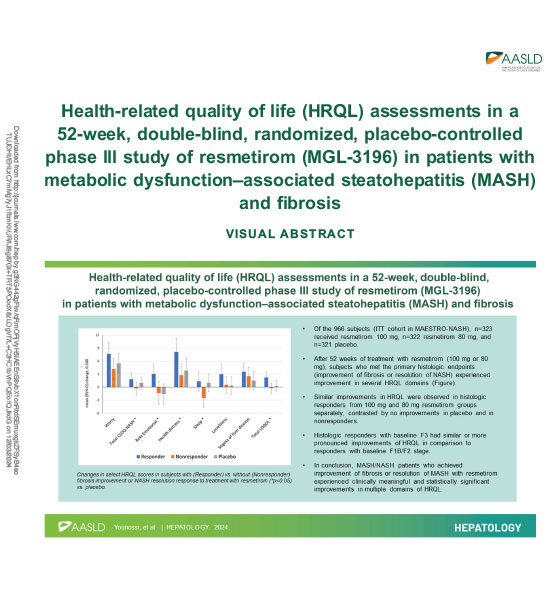Health-related quality of life (HRQL) assessments in a 52-week, double-blind, randomized, placebo-controlled phase III study of resmetirom (MGL-3196) in patients with metabolic dysfunction–associated
September 2024
Hepatology
Abstract
Background and Aims: Resmetirom, liver-directed thyroid-hormone receptor- β agonist, received approval for metabolic dysfunction–associated steatohepatitis (MASH) treatment. We assessed health-related quality of life (HRQL) in patients with MASH treated with resmetirom.
Approach and results: Patients with MASH/NASH without cirrhosis and with confirmed/suspected fibrosis were enrolled in a 54-month double-blind randomized placebo-controlled phase III clinical trial with serial biopsy assessments at baseline and week 52 (MAESTRO-NASH, NCT03900429). HRQL was assessed using Chronic Liver Disease Questionnaire-NASH (CLDQ-NAFLD) and Liver Disease Quality of Life (LDQOL). Baseline HRQL score changes by treatment group (resmetirom 80 mg, resmetirom 100 mg, or placebo) and histological response (improvement of fibrosis without worsening of NAS or resolution of MASH/NASH without worsening of fibrosis) were compared after 52 weeks. Included were 966 intention-to-treat patients: 323 received resmetirom 100 mg, 322 resmetirom 80 mg, and 321 placebo. By weeks 24 and 52, patients receiving 80 or 100 mg resmetirom experienced HRQL improvement in CLDQ-NAFLD Worry domain (mean +0.21 to +0.24, p < 0.05). At week 52, subjects who met histologic endpoints after treatment with resmetirom (100 mg and 80 mg pooled) experienced HRQL improvement in CLDQ-NAFLD Worry +0.46 (41%met minimal clinically important difference [MCID]), LDQOL domains: Role Emotional +3.0 (28% met MCID), Health Distress +8.1 (38% MCID), Stigma +3.5 (39% MCID), and total LDQOL +2.2 (35% MCID) (all p < 0.05). Similar improvements were noted in histologic responders from 100 mg or 80 mg resmetirom groups when separated—no improvements in placebo or nonresponders. Baseline F3 histologic responders had similar/more pronounced HRQL improvements.
Conclusions: Patients with MASH/NASH with fibrosis improvement or the resolution of MASH with resmetirom experienced clinically meaningful and statistically significant HRQL improvements.

